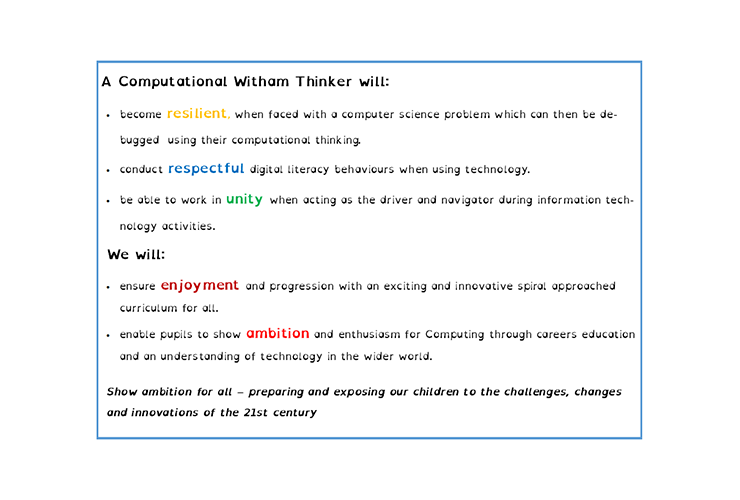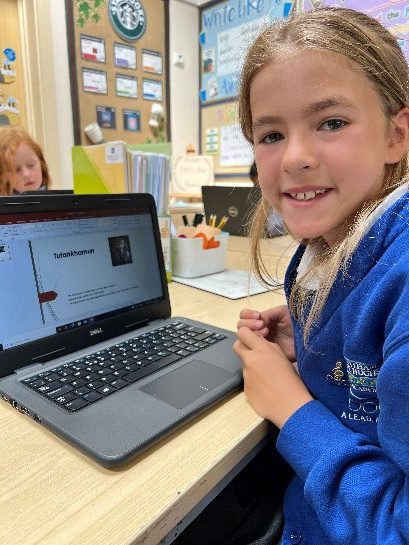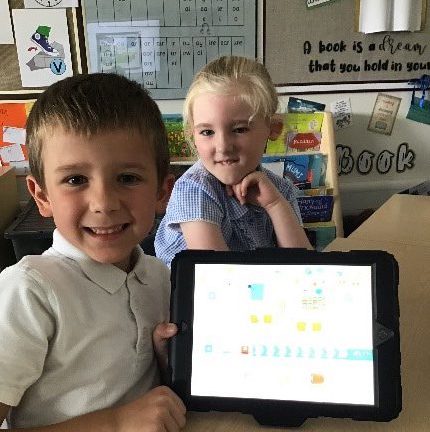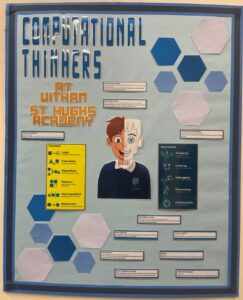
Learning computing at Witham St Hughs Academy allows children to journey into the digital world of technology and beyond. Pupils at our Academy learn about the digital world through 3 main strands; Digital Literacy, Computer Science and Information Technology.
Pupils are given daily opportunities to explore the many aspects of computing by using a range of digital technologies whilst also showing enjoyment, unity, ambition and resilience, at the same time as ensuring they are operating safely and appropriately as they experience the digital world we all live in today.
During a pupil’s time as a Computational Thinker at Witham St Hughs Academy, they will develop a range of digital literacy skills and computational skills, which they will use and develop further in the wider world.

As the digital world is developing daily, we believe the computing curriculum should also develop regularly to ensure the pupils at Witham St Hughs Academy receive the most current and inspiring curriculum. Therefore, our curriculum is embedded following the National Curriculum requirements and the National Centre for Computing Education (NCCE) guidance, allowing for our pupils to receive a tailored curriculum with progressive lessons based on teacher knowledge and the latest research.
As an Academy, we guarantee all computational skills are taught with progression, ensuring all skills are developed thoroughly along a pupil’s journey through the Academy, equipping pupils with the correct knowledge for the digital age.
Disciplinary and Substantive Knowledge
Through using computational thinking, pupils at Witham St Hughs Academy develop substantive knowledge in computing through the 3 mains strands. The first strand which is woven into our computing curriculum is ‘Computer Science’. This strand allows pupils to develop their programming skills, develop an understanding of algorithms and be able to apply these computational skills to a range of digital and non-digital devices (unplugged lessons).
The second strand, which is woven into our computing curriculum, is ‘Digital Literacy’. This strand ensures that pupils at Witham St Hughs Academy have a secure knowledge of e-safety and the 4 C’s: Content, Contact, Conduct and Commercialism. Our curriculum allows for the pupils to develop their understanding of using the internet safely in a range of cross curricular lessons, including Character Education, English and Wider Curriculum lessons. As the curriculum allows children to continuously build on their computational knowledge, the 4 C’s are regularly and explicitly taught within each year group and unit of study. The final strand of computing delivered through our curriculum is ‘Information Technology’.
Information technology allows pupil to showcase their digital creative skills through a range of apps and final pieces of digital outcomes including podcasts, films and presentations, whilst ensuring our pupils understand the fundamental skills of using a computer including how to create, store, save and retrieve digital documents.
Our computing curriculum is taught using an approach which allows pupils to develop and expand their knowledge from EYFS to Year 6 and to ensure these skills can be utilised further in KS3. Pupils at Witham St Hughs Academy have access to a range of digital devices including laptops, iPads, programmable robots and a range of recording devices. Every year group across the Academy is encouraged to use a wide range of technologies to enhance their computing lessons whilst also developing an understanding of computing careers and unplugged activities.
Witham St Hughs Academy has high aspirations for all pupils and their digital opportunities of the wider world. Pupils at our Academy who have shown a passion towards exploring the digital world further, have been provided with explicit roles as ‘Digital Leaders’ and ‘Computing Champions’. The digital leader team work alongside the computing leaders to create relevant information for pupils and parents, this is created to inform all of the fantastic opportunities available within the digital world and to also inspire other pupils by showcasing their computing skills and new technologies. Digital Leaders also update their ‘Computational Thinking’ display regularly to share what they believe a ‘Witham Computational Thinker’ pupil should be. Here the pupils display language and explanations linked to the digital world and also career opportunities to inspire all. Alongside this, Witham St Hughs Academy regularly take part in online computing career discussions with well know computing organisations (TechShecan) and also face-to-face computing speakers and organisations who work with technology.
Pupils at Witham St Hughs Academy have the opportunity to showcase their enjoyment and resilience for computing through a range of computing challenges, created by the class teachers, the computing leaders and also the Digital Leaders. These challenges are to allow for all pupils to access the computing curriculum in a creative manner and express themselves in a safe, digital format. The cross-curricular aspects allow for children to be able to learn a range of computing based skills in their computing lessons which can then be transferred to other subjects, for example Y3 pupils learn about the important historical figures during the Ancient Egyptian period and can present this information in a digital format of a comic strip. Pupil’s computing knowledge and achievements are document through a class Padlet. This allows all teachers across the Academy the opportunity to understand the concepts that have been taught previously allowing for well-structured lessons to be taught and any misconceptions to be addressed.
Pupils at Witham St Hughs Academy build their knowledge of computing through a vast range of experiences. Pupils have regular access to all digital technologies within the Academy and are encouraged to use these across a range of subjects to enhance their digital literacy skills. Digital Leaders have the opportunities to host information stands at parents evening, introduce new educational apps to parents and children and also to inform the community of gaming rules, requirement and language.
The Digital Leaders have had the opportunity to create and present safer internet day assemblies, vlogs and activities to both KS1 and KS2 children. All pupils have the opportunity throughout the year to take part in virtual presentations about digital careers and take part in a range of STEM based activities which include working with digital technologies. Pupils at Witham St Hughs Academy have access to range of computing extra-curricular clubs, taught by specialist outside agencies including coding and iMedia.

Computing can been seen across Witham St Hughs Academy in a variety of places and forms, especially digitally! Teachers across the Academy document pupils’ work on the digital platform, Padlet, which is shared across the Academy with teachers and pupils to model fantastic practice! Pupils’ coding work is also documented on an online Scratch portal, which can be shared with teachers and pupils across the Academy as a celebration of the pupils’ achievements and monitoring of their progress.
Careers and computing language is showcased on the Digital Leaders display board in the corridor, which the Digital Leaders update regularly to inspire all pupils across the Academy.

Pupils at Witham St Hughs Academy have had many opportunities to collaborate with outside agencies. Our computing subject leaders have worked closely with local secondary schools to source VR headsets for immersive experiences to enhance topic learning. Pupils across the Academy have had the opportunity to work with local visual art centers to create digital pieces of artwork. Within our Academy, sustainability is a great focus and the Academy is working to establish links with local universities to explore the use of technology in agriculture. Through our innovative computing curriculum, we aspire for all pupils to be prepared and exposed for the challenges and changes of the 21st century.